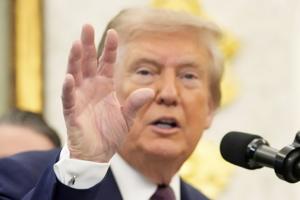President Donald Trump has proposed deploying National Guard troops to New Orleans as part of a strategy to address what he describes as a significant crime problem in the city. This suggestion raises concerns from local officials who argue that crime rates have dropped considerably this year. Trump’s comments come as he plans to send federal law enforcement to several major cities, including Chicago and Baltimore, following a recent deployment of federal agents to Washington, D.C.
City leaders, including City Council President J.P. Morrell, have expressed strong opposition to the deployment, asserting that it would be an unnecessary show of force. Morrell stated, “Marching troops into New Orleans is an unnecessary show of force in effort to create a solution to a problem that doesn’t exist.” According to the New Orleans Police Department, violent crime has decreased by 20% this year compared to the previous year, even as the city continues to recover from earlier safety challenges.
Republican Governor Jeff Landry has shown support for Trump’s initiative, indicating on social media that Louisiana welcomes federal assistance, stating, “We will take President @realDonaldTrump’s help from New Orleans to Shreveport!” This support contrasts sharply with the sentiments of the city’s Democratic leaders, who emphasize local control and the progress made in improving public safety.
The debate over federal intervention reflects a broader national conversation about crime and public safety. House Majority Leader Steve Scalise, a Republican representing the suburbs of New Orleans, endorsed the idea, asserting that residents deserve the same level of security provided in Washington, D.C. Scalise remarked, “We should all be in favor of increased safety for our citizens and lower crime.”
Local Leaders Push Back Against Federal Troops
Local officials argue that the presence of federal troops could create more problems than it solves. The New Orleans City Council, in a joint statement with the police department, acknowledged the importance of federal and state partnerships but insisted on the need for local solutions. “Our federal and state partnerships have played a significant role in ensuring public safety, particularly during special events for a world-class city,” the statement read.
Mayor LaToya Cantrell, who has faced her own legal issues, including a federal indictment for allegedly lying about a relationship with her bodyguard, also expressed skepticism towards the need for extra military presence in the city. Cantrell’s office emphasized the city’s commitment to sustaining public safety improvements without federal intervention.
The political ramifications of Trump’s proposal are significant, especially as New Orleans prepares for upcoming mayoral elections. Several candidates, including Vice President Helena Moreno, have condemned the notion of federal troops, framing it as a political maneuver rather than a genuine effort to address community concerns. Moreno stated, “This is about scare tactics and politicizing public safety.”
National Context and Future Implications
Trump’s push for federal troop deployment is part of a larger strategy to assert control over urban crime issues. His administration has been vocal about seeking to implement tougher measures in cities they claim are struggling with law enforcement. Concurrently, Trump has been involved in international discussions, including an anticipated call with Ukrainian President Volodymyr Zelenskyy to discuss the ongoing conflict with Russia.
These developments occur against the backdrop of a politically charged environment, where local and federal relations are increasingly strained. The response from local leaders in New Orleans highlights the complexities of governance in urban areas, especially concerning federal involvement in local law enforcement.
As this situation unfolds, it will be critical to monitor how the discussions around crime and public safety evolve, especially in the context of upcoming elections and shifting political dynamics. The debate in New Orleans serves as a microcosm of national conversations about law enforcement, community safety, and the role of federal intervention in local affairs.
